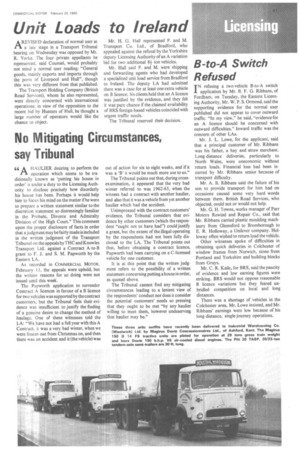No Mitigating Circumstances, say Tribunal
Page 43

If you've noticed an error in this article please click here to report it so we can fix it.
44 A HAULIER desiring to perform the
operation which seems to be traditionally known as 'putting his house in order' is under a duty to the Licensing Authority to disclose precisely how disorderly his house has been. Perhaps it would help him to focus his mind on the matter if he were to prepare a written statement similar to the discretion statement so distressingly familiar in the Probate, Divorce and Admiralty Division of the High Court." This comment upon the proper disclosure of facts in order that a judgment may be fairly made is included in the written judgment of the Transport Tribunal on the appeals by THC and Knowles Transport Ltd. against a Contract A-to-B grant to F. J. and S. M. Papworth by the Eastern LA.
As recorded in COMMERCIAL MOTOR, February 11, the appeals were upheld, but the written reasons for so doing were not issued until this week.
The Papworth application to surrender Contract A licences in favour of a B licence for two vehicles was supportedby the contract customers, but the Tribunal feels their evidence was insufficient to justify the finding of a genuine desire to change the method of haulage. One of these witnesses told the LA: "We have not had a full year with this A Contract, it was a very bad winter, when we were frozen out from Christmas on, and then there was an accident and it (the vehicle) was out of action for six to eight weeks, and if it was a '13' it would be much more use to us."
The Tribunal points out that, during crossexamination, it appeared that the very bad winter referred to was 1962-63, when the witness had a contract with another haulier, and also that it was a vehicle from yet another haulier which had the accident.
Unimpressed with the contract customers' evidence, the Tribunal considers that evidence by other customers (which the respondent "ought not to have had") could justify a grant, but the extent of the illegal operating by the respondents had not been fully disclosed to the LA. The Tribunal points out that, before obtaining a contract licence, Papworth had been carrying on a C-licensed vehicle for one customer.
It is at this point that the written judgment refers to the possibility of a written statement concerning putting a house in order, as quoted above.
The Tribunal cannot find any mitigating circumstances leading to a lenient view of the respondents' conduct nor does it consider the potential customers' needs so pressing that they ought to be met "by any haulier willing to meet them, however undeserving that haulier may be."




























































































































